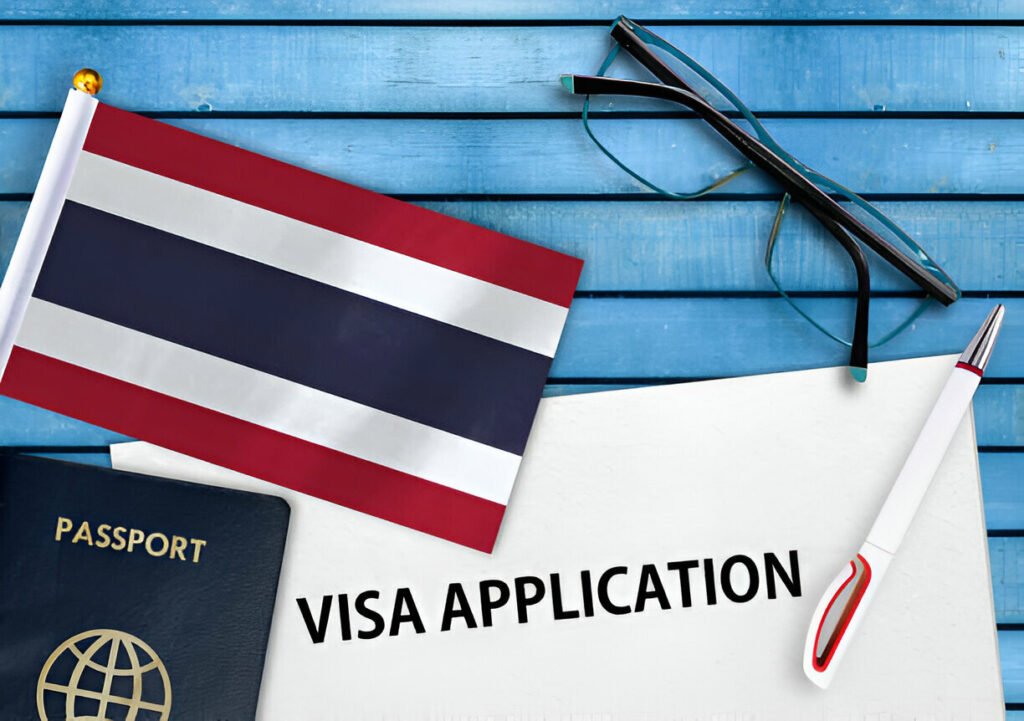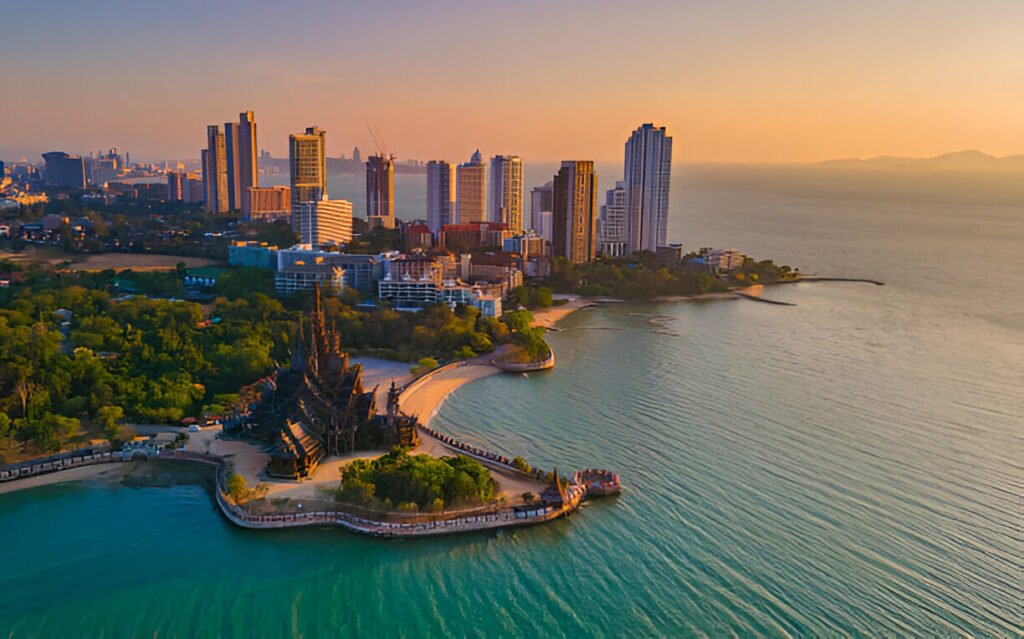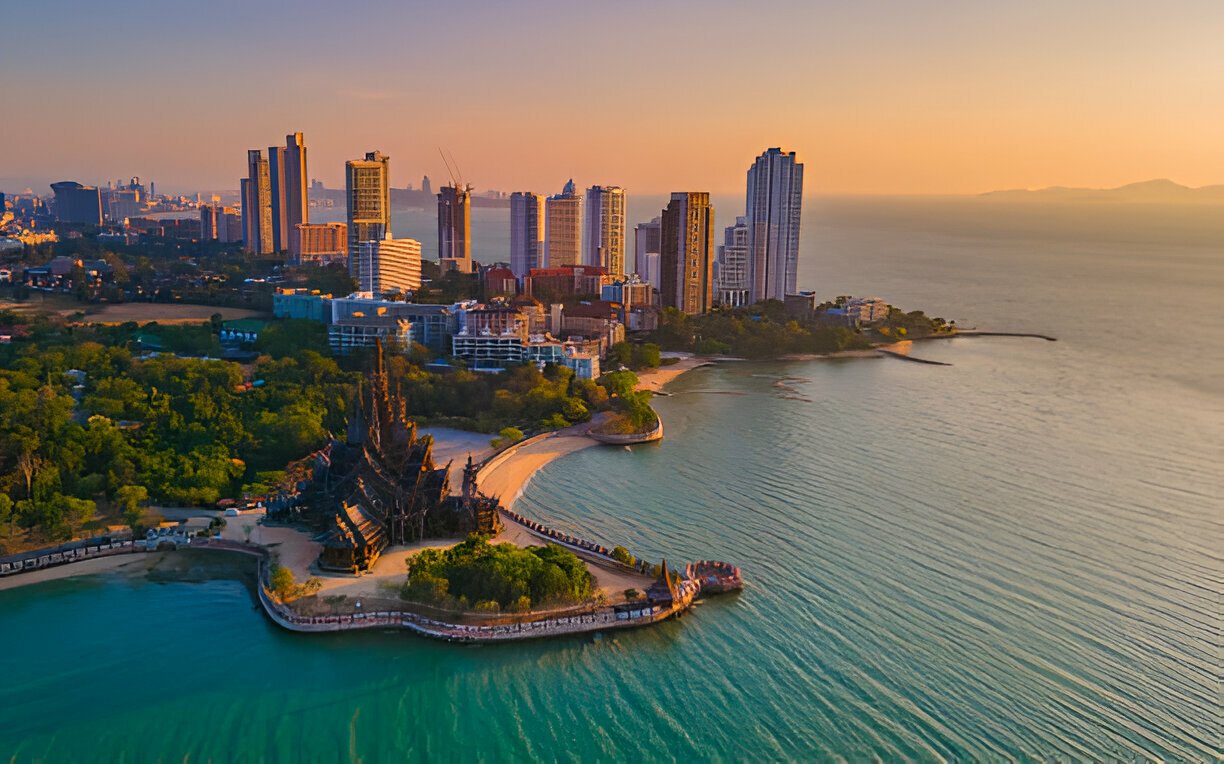In recent years, the digital nomad lifestyle has transformed from a niche trend into a global movement. More people than ever are choosing to work remotely while exploring new cultures, living in different countries, and embracing the freedom of location independence. This shift has been fueled by advances in technology, the normalization of remote work, and a growing demand for flexibility in the modern workforce.
Thailand has long been a favorite destination for digital nomads. With its tropical climate, low cost of living, fast internet, and vibrant cultural scene, the country offers an ideal environment for remote professionals. Cities like Chiang Mai, Bangkok, and Phuket have become hotspots for coworking spaces, digital nomad meetups, and international communities.
As the digital nomad population grows, many countries, including Thailand, have started rethinking their visa policies to attract remote workers legally and for longer durations. This article explores the options available for digital nomads who want to live and work in Thailand legally, including whether the country offers a true “Digital Nomad Visa Thailand,” what alternatives exist, and how to navigate the legal and practical aspects of working remotely from Thailand.
Does Thailand Offer a Digital Nomad Visa?

Thailand has recently taken a significant step toward welcoming remote professionals with the Destination Thailand Visa (DTV) launch. Introduced in 2024, this visa offers digital nomads a legal and flexible way to live and work remotely from within the country. While Thailand had previously lacked a visa tailored specifically to the needs of freelancers and remote workers, the DTV now fills that gap with a clearly defined framework.
The visa is designed for individuals who are employed by companies outside Thailand or those who freelance for foreign clients. It supports Thailand’s growing reputation as a global hub for digital nomads, particularly in cities like Chiang Mai, Bangkok, and Phuket. The DTV allows remote professionals to legally stay in the country for extended periods without needing to rely on short-term tourist visas or frequent visa runs.
This new visa also reflects a broader shift in Thai immigration policy from viewing remote work as a legal grey area to formally recognizing the economic and cultural contributions of digital nomads. By offering a five-year visa with generous stay periods and multiple entries, Thailand aims to attract long-term, self-sufficient professionals who contribute to the local economy while working globally.
Long-Term Resident (LTR) Visa for Digital Nomads
Before the introduction of the Destination Thailand Visa (DTV), one of the main options for remote professionals seeking long-term residence in Thailand was the Long-Term Resident (LTR) Visa. While not originally designed for digital nomads, this visa includes a specific category for remote workers employed by foreign companies, making it a viable option for high-earning professionals in the remote work space.
The LTR Visa is a 10-year renewable visa targeting four main groups: wealthy global citizens, wealthy pensioners, professionals working from Thailand, and highly skilled professionals. For digital nomads, the most relevant category is the “Work-from-Thailand Professionals” track.
To qualify under this category, applicants must meet several criteria:
- Be employed by a company registered and operating outside Thailand.
- Have a minimum personal income of USD 80,000 per year over the past two years. (In some cases, income of USD 40,000 per year is acceptable with advanced degrees or specialized experience.)
- Have at least five years of work experience in the relevant field.
- Hold health insurance covering at least USD 50,000, or show proof of financial readiness to cover medical expenses.
The LTR Visa comes with several significant benefits:
- A 10-year stay with multiple entry privileges.
- Fast-track services at major international airports in Thailand.
- Access to a digital work permit (if needed for business activity within Thailand).
- A reduced personal income tax rate (17%) for those who qualify under the highly skilled professional category.
However, it’s important to note that the LTR Visa is best suited for experienced professionals with high income and formal employment. It may not be practical for freelancers or digital nomads just starting out. For that group, the Destination Thailand Visa (DTV) or other short- to medium-term options may be more accessible.
Alternative Visa Options for Digital Nomads
While Thailand has introduced more targeted visas like the Destination Thailand Visa (DTV) and the Long-Term Resident (LTR) Visa, not every digital nomad meets the income or documentation requirements for these programs. Fortunately, there are still several alternative visa options that many remote workers continue to use, each with its own advantages and limitations, depending on your length of stay, income level, and type of work.
1. Tourist Visa and Visa Extensions

Many digital nomads begin their stay in Thailand on a single-entry or multiple-entry tourist visa. These typically allow for 60 days in the country, with a possible extension of 30 additional days. While tourist visas do not legally permit working even remotely, many digital nomads have historically used them while working discreetly for clients or employers overseas. This approach carries legal risk, as working while on a tourist visa is technically a violation of immigration laws.
2. Education Visa (ED Visa)

Some nomads opt for an education visa by enrolling in a Thai language course or cultural program. These visas can offer long-term stay opportunities, typically 6 months to 1 year, with possible renewals. While technically for educational purposes, ED visas have often been used by remote workers looking to stay longer without qualifying for more formal programs. However, authorities are increasingly scrutinizing ED visa holders to ensure they are genuinely participating in coursework.
3. Thai Elite Visa (Privilege Entry Visa)
The Thai Elite Visa is a long-term residency option for individuals who are willing to pay a premium for convenience and flexibility. Packages start at around 900,000 THB (approx. USD 25,000) for a 5-year visa and go up to 20 years. It offers multiple-entry access, airport services, and a simplified immigration process. This is a popular option among high-income digital nomads who want hassle-free residency without employment requirements.
4. Smart Visa
The Smart Visa is designed for professionals in high-tech industries such as IT, biotechnology, and digital services. It’s suitable for startup founders, investors, and skilled employees. To qualify, applicants typically need a job offer from a company endorsed by the Thai government or be part of an approved startup ecosystem. While more restrictive in scope, this visa offers up to four years of stay and includes work authorization.
Legal and Tax Considerations
For digital nomads planning to stay in Thailand, understanding the country’s legal and tax environment is essential. While the right visa grants legal residency, it doesn’t always automatically permit employment or address tax obligations. Working remotely from Thailand, even for a foreign employer, can fall into legal gray areas if you’re not on a visa that explicitly allows it.
Work Authorization and Visa Compliance
Thailand strictly regulates employment within its borders. Tourist and education visas, for example, do not permit any form of work, including remote work for companies outside Thailand. Although enforcement has historically been lax, immigration authorities are becoming more proactive in identifying and penalizing unauthorized work activities. To remain compliant, digital nomads should use visa types that explicitly permit remote work, such as the Destination Thailand Visa (DTV) or the LTR Visa under the “work-from-Thailand professional” category.
Engaging with local clients, conducting business with Thai entities, or earning income from within Thailand typically requires a work permit and business visa. Violating work regulations can result in fines, visa cancellation, or deportation.
Tax Residency Rules
Tax liability in Thailand is determined by residency status. You are considered a tax resident if you stay in the country for 180 days or more in a calendar year. As a tax resident, you may be required to report and potentially pay tax on worldwide income, although this depends on the source of your income and applicable double taxation treaties.
If you’re not a tax resident, you’re generally taxed only on income earned within Thailand. However, ambiguity remains around remote income earned abroad but brought into the country, especially with evolving enforcement policies.
Withholding and Income Tax Rates
For digital nomads working legally through the LTR Visa or similar programs, income tax may apply based on your earnings. For example, professionals under the LTR Visa’s “highly skilled” category may benefit from a reduced flat tax rate of 17% on local income. Others may be subject to Thailand’s progressive tax brackets, which range from 5% to 35% depending on annual earnings.
Banking, Invoicing, and Financial Setup
Opening a Thai bank account can simplify financial management and reduce currency exchange fees. Most long-term visa holders are eligible to open accounts with local banks, though requirements vary. Freelancers may also need to set up invoicing and payment systems that are compatible with Thai banking laws while maintaining foreign tax compliance.
Best Cities in Thailand for Digital Nomads
Thailand offers an excellent balance of affordability, modern infrastructure, natural beauty, and cultural richness, making it a favorite destination for digital nomads from around the world. However, not all cities offer the same experience. Depending on your lifestyle preferences, work habits, and budget, some places will suit you better than others. Here are the top cities for remote workers in Thailand:

1. Chiang Mai
Often referred to as the digital nomad capital of Southeast Asia, Chiang Mai has long been the first choice for remote professionals. Located in northern Thailand, it offers a laid-back lifestyle, an abundance of coworking spaces, affordable living, and a vibrant nomad community.
- Why it’s ideal: Low cost of living, strong Wi-Fi, coworking hubs, relaxed pace.
- Best for: Freelancers, content creators, and remote workers looking for community and budget-friendly living.
2. Bangkok
Thailand’s bustling capital offers a fast-paced, cosmopolitan lifestyle with excellent connectivity and endless options for dining, entertainment, and business networking. While it’s more expensive than other Thai cities, the infrastructure is unmatched.
- Why it’s ideal: International airports, high-speed internet, world-class amenities.
- Best for: Entrepreneurs, digital marketers, consultants, and anyone who thrives in a big city environment.
3. Phuket
Phuket blends island life with modern comforts. It has grown as a remote work destination, particularly for those who want to be close to the beach while maintaining access to coworking spaces, gyms, and international schools.
- Why it’s ideal: Beach lifestyle, wellness scene, expat-friendly.
- Best for: Health coaches, creative professionals, and families seeking coastal living.
4. Koh Phangan
Famous for its Full Moon Parties, Koh Phangan is evolving into a peaceful haven for digital nomads. The island offers scenic beauty, wellness retreats, and a growing coworking infrastructure.
- Why it’s ideal: Tranquil atmosphere, strong remote work community, scenic views.
- Best for: Writers, developers, and spiritual entrepreneurs seeking solitude and inspiration.
5. Hua Hin
A quieter coastal town only a few hours from Bangkok, Hua Hin is gaining popularity among remote workers for its relaxed vibe, affordable housing, and access to beaches without the tourist crowds.
- Why it’s ideal: Calm environment, lower costs, family-friendly.
- Best for: Remote workers seeking peace, retirees doing freelance work, or anyone wanting to avoid the bustle of bigger cities.
How to Apply for a Digital Nomad Visa in Thailand
Applying for a digital nomad visa in Thailand involves different processes depending on the type of visa you’re pursuing. Whether you’re applying for the new Destination Thailand Visa (DTV) or the more exclusive Long-Term Resident (LTR) Visa, it’s essential to prepare your documents carefully and follow the correct application steps to avoid delays or rejections.
A. Applying for the Destination Thailand Visa (DTV)
Step 1: Check Eligibility
Ensure you meet the basic criteria:
- A remote worker or freelancer working for a company outside Thailand.
- Aged between 20 and 50 years old.
- Able to provide proof of income or savings (typically, financial stability is required).
- No criminal record or history of overstaying visas.
Step 2: Gather Required Documents
- Valid passport (with at least 6 months’ validity).
- Recent passport-sized photos.
- Proof of income or bank statements.
- Proof of accommodation in Thailand (hotel booking or rental agreement).
- Health insurance with coverage for the duration of your stay.
Step 3: Apply Online or at a Thai Embassy
The DTV can be applied for through the official Thai e-visa portal or at your local Thai embassy or consulate. Choose your intended length of stay (up to 180 days initially) and pay the application fee.
Step 4: Wait for Approval
Processing times may vary but typically take between 5 to 15 business days. Once approved, you’ll receive an entry letter or visa sticker.
Step 5: Enter Thailand and Register
Upon arrival, register your address with Thai Immigration (within 24 hours). You may also need to report every 90 days if staying long-term.
B. Applying for the Long-Term Resident (LTR) Visa
Step 1: Choose the Relevant LTR Category
For digital nomads, the most relevant category is Work-from-Thailand Professionals.
Step 2: Pre-Screen Your Application with the BOI
Before applying for the LTR Visa, you must submit your application to the Thailand Board of Investment (BOI) for pre-approval. This involves uploading documents to their online system.
Step 3: Submit Required Documents
- Passport
- Proof of employment with a foreign company
- Evidence of income (USD 80,000+ per year, or USD 40,000 with advanced degree)
- Health insurance with at least USD 50,000 coverage
- Educational certificates or resume showing 5+ years of experience
Step 4: Receive Endorsement Letter
Once approved by the BOI, you will receive an endorsement letter to submit to the Immigration Bureau.
Step 5: Apply for the LTR Visa
Submit your final application at a Thai embassy, consulate, or designated immigration office. Pay the visa fee (approximately 50,000 THB).
Step 6: Collect Your Visa and Begin Your Stay
Once granted, you can begin your 10-year stay and enjoy the benefits of the LTR program. Remember to complete annual reporting and renew insurance coverage as needed.
FAQs About Digital Nomad Visa Thailand
Can I legally work remotely in Thailand on a tourist visa?
Technically, no. Tourist visas do not permit any form of work, including remote work for overseas employers. Working while on a tourist visa can lead to visa cancellation or fines. It’s recommended to obtain a visa specifically designed for remote work, such as the Destination Thailand Visa or LTR Visa.
How long can I stay in Thailand as a digital nomad?
Visa lengths vary: the Destination Thailand Visa allows stays up to 180 days, while the Long-Term Resident Visa offers up to 10 years of residency under certain categories. Other visas, like tourist or education visas, have shorter durations and may require extensions.
Is the cost of living in Thailand affordable for digital nomads?
Yes. Thailand offers a range of living costs depending on location and lifestyle. Cities like Chiang Mai provide affordable housing and amenities, while Bangkok and Phuket tend to be pricier. Overall, Thailand remains cost-effective compared to many Western countries.
What is the internet quality like for remote work?
Thailand has generally reliable and fast internet, especially in major cities and popular nomad hubs. Coworking spaces and cafes commonly provide high-speed Wi-Fi, making remote work convenient.
Do I need health insurance while living in Thailand?
Yes. Health insurance is often a mandatory requirement for visa applications, particularly for digital nomad and long-term visas. It’s advisable to have coverage that includes COVID-19 and medical evacuation.
How easy is it to find coworking spaces in Thailand?
Very easy. Popular cities like Chiang Mai, Bangkok, and Phuket have numerous coworking spaces with amenities tailored for digital nomads, including meeting rooms, fast internet, and networking events.
Can I bring my family with me as a digital nomad?
Yes, but visa options and requirements vary for dependents. Some long-term visas allow family members to join you, but it often involves additional paperwork and financial proof.
Hi there. My name is Abbas Khan. I’m passionate about finding smart ways to save and make money from anywhere in the world.
Learning how to earn remotely and manage my finances gave me true freedom, and now I want to help you do the same.
Join me as I explore money-saving hacks, income ideas, and tips to build a flexible, location-independent lifestyle you’ll love.


3 thoughts on “Digital Nomad Visa Thailand – Guide”